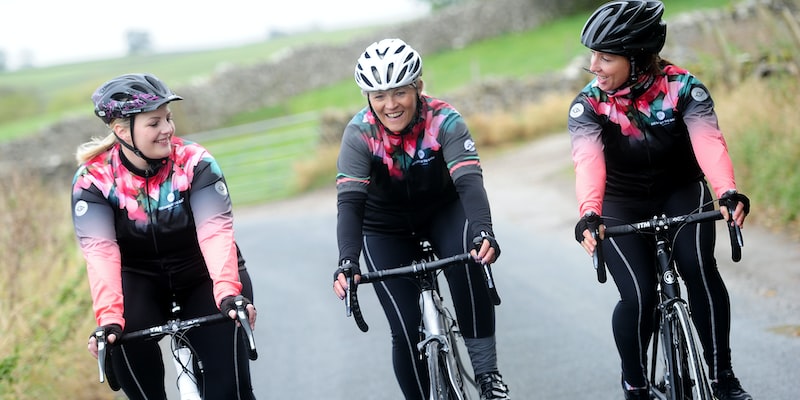
Exploring the Physical and Mental Benefits of Professional Women's Cycling
As professional women's cycling continues to grow in popularity, more and more women are taking up the sport. From amateur weekend warriors to elite athletes, women are pushing their physical and mental limits with the goal of becoming the best cyclist they can be. But what does this kind of intense physical activity do to a woman's body? What are the physical and mental benefits that come from being a professional cyclist?At the most basic level, professional cycling benefits a woman's body by improving her cardiovascular health, muscle strength, and overall fitness. By training for long distances and competing in races, a woman can build her endurance and increase her speed. The physical demands of professional cycling can also help tone muscles and burn fat, leading to a leaner physique. Professional cyclists also benefit from reduced body fat percentage and improved posture, as cycling requires the rider to stay in an upright position for extended periods of time.
In addition to physical benefits, professional cycling can also have a positive effect on a woman's mental health. The mental discipline and focus required to compete at a professional level can help foster a sense of self-discipline and confidence. Additionally, the physical exertion of cycling can help relieve stress and provide an outlet for emotional release. Women who compete professionally also gain a sense of accomplishment and pride, as they have put in the hard work to reach their goals.
Finally, being a professional cyclist can also provide a woman with a unique sense of community. As she trains and competes, she will build relationships with other cyclists and gain a new support system. This social aspect of cycling can be invaluable for a woman's emotional wellbeing, as well as for her professional development.
Overall, there are numerous benefits to becoming a professional cyclist. Women who take the time to invest in their physical and mental health through cycling can reap the rewards both on and off the bike.
Understanding the Physical and Psychological Challenges of Being a Professional Cyclist
Being a professional cyclist is no easy feat, especially for women. From the physical strain of long-distance cycling to the psychological challenges of competing in a male-dominated sport, female cyclists face a unique set of obstacles. Understanding the physical and psychological effects of cycling can help women navigate the sport and ultimately reach their goals.Physically, cycling requires immense endurance and strength. Professional cyclists must have a strong cardiovascular system and be comfortable with long-distance rides. This can lead to physical strain and fatigue, which can be especially difficult for women due to their smaller body size and less muscle mass. Furthermore, female cyclists often have to battle against the elements, such as wind, rain, and intense heat, which can further exacerbate the physical strain.
On the psychological side, female cyclists must contend with competing in a male-dominated sport. This can lead to feelings of isolation, self-doubt, and even fear. Additionally, female cyclists may struggle with more subtle forms of sexism, such as being overlooked by sponsors or having their accomplishments minimized.
The physical and psychological challenges of being a professional cyclist can be daunting, but they can also be incredibly rewarding. Understanding the unique challenges women face can help them prepare for the journey ahead. With the right support and dedication, women can make their mark in the world of cycling and achieve their dreams.
Examining the Impact of Professional Cycling on Women's Health and Well-being
Cycling is a great form of exercise, and many people turn to it as a way to stay fit, lose weight, and improve their overall health. But what happens to a woman's body when she takes cycling to the professional level? As professional cycling has become more popular and competitive, it's important to examine the impact that it can have on women's health and well-being.First, professional cyclists need to be in peak physical condition. This means that they must maintain a rigorous training schedule and diet, and they may need to take supplements or medications to ensure that they are performing at their best. This can put a lot of strain on the body, and it can lead to injuries and illnesses if it's not done correctly.
Second, professional cycling can also have an impact on a woman's hormone levels. The intense physical activity can cause the body to produce more testosterone, which can lead to a variety of changes in a woman's body. These changes can include increased muscle mass, changes in body composition, and even changes in mood and energy.
Finally, professional cycling can also be a very demanding sport. The long hours, intense competition, and high stakes can be difficult to manage and can put a lot of stress on a woman's body. This can lead to physical and emotional exhaustion, and it can even lead to burnout if the cyclist isn't careful.
In conclusion, professional cycling can have a significant impact on a woman's body. It's important to be aware of the potential risks and take measures to ensure that the cyclist is taking proper care of her body and mind. With the right precautions and support, professional cycling can be an enjoyable and rewarding experience for any woman.
Unpacking the Benefits and Drawbacks of Professional Women's Cycling
As with any form of exercise, there are many benefits to professional women’s cycling. Professional women cyclists have greater access to great nutrition, leading to improved health and performance, as well as increased camaraderie and support from the cycling community.However, there are some drawbacks to professional women’s cycling, including an increased risk of injuries, especially to the knees, hips, and lower back. Professional women cyclists also have to maintain a certain level of fitness and form, which can be difficult to maintain over time. The physical demands of cycling can also be taxing on the body, leading to fatigue and exhaustion.
The best way to combat these drawbacks is to take proper precautions and take the necessary steps to stay healthy and injury-free. This includes proper nutrition, stretching, and rest. It is also important to find a coach or mentor that can help with form and technique, and provide guidance on how to balance the demands of professional cycling with a healthy lifestyle.
Overall, professional women’s cycling can be an incredibly rewarding and fulfilling experience. However, it is important to be aware of the demands of the sport and take the necessary steps to stay healthy and injury-free. With the right training and guidance, professional women cyclists can reap the benefits of this exciting and challenging sport.
